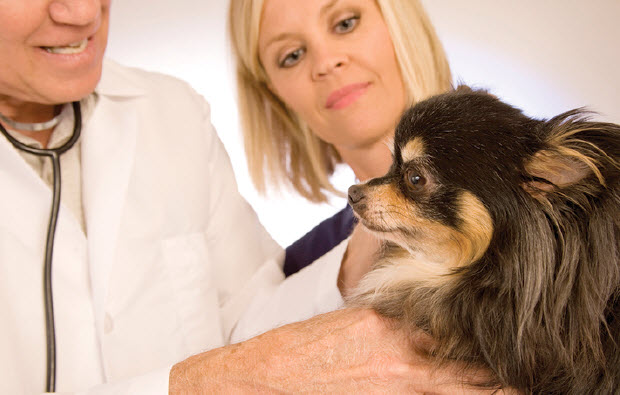
Choosing a Chihuahua
Chihuahua's are little pups with big reputations. They are wonderful companion pets for several reasons:
- Alert, curious, and busy
- Adaptable to a wide variety of living conditions
- Confident and self-reliant
- Vigilant watchdog with a ready bark
- Doesn’t need much exercise
However, no dog is perfect! You might also see these traits:
- Needs early socialization to accept other pets and strangers
- Fragile and easily injured due to small size
- Needs frequent attention from family
- Bold and fearless, may attack much larger dogs
- May have a tendency to bark excessively
 She is a loyal and alert member of the family that demands attention at all times. Her small size also makes her an excellent traveling companion.
She is a loyal and alert member of the family that demands attention at all times. Her small size also makes her an excellent traveling companion.
The Chihuahua is the smallest of all dogs breeds and has smooth and long-haired coat varieties. Originating in Mexico, Chihuahuas were bred for companionship. They are best known for their big, erect ears and large, prominent eyes. The Chihuahua’s personality is comparable to a terrier’s—fearless and devoted. Chihuahuas are a generally healthy breed with an average lifespan of 12-14 years.
Your Chihuahua's Health
We know that because you care so much about your dog, you want to take good care of her. That is why we have summarized the health concerns we will be discussing with you over the life of your Chihuahua. By knowing about health concerns specific to Chihuahuas, your Animal Hospital of Springfield team can tailor a preventive health plan to watch for and hopefully prevent some predictable risks.
Many diseases and health conditions are genetic, meaning they are related to your pet’s breed. There is a general consensus among canine genetic researchers and veterinary practitioners that the conditions we’ve described herein have a significant rate of incidence and/or impact in this breed. That does not mean your dog will have these problems; it just means that she is more at risk than other dogs. We will describe the most common issues seen in Chihuahuas to give you an idea of what may come up in her future. Of course, we can’t cover every possibility here, so always check with us if you notice any unusual signs or symptoms.
This guide contains general health information important to all canines as well as the most important genetic predispositions for Chihuahuas. This information helps you and us together plan for your pet’s unique medical needs. At the end of the article, we have also included a description of what you can do at home to keep your Chi looking and feeling her best. You will know what to watch for, and we will all feel better knowing that we’re taking the best possible care of your pal.
General Health Information for your Chihuahua
Dental Disease
Dental disease is the most common chronic problem in pets, affecting 80% of all dogs by age two. Unfortunately, your Chihuahua is more likely than other dogs to have problems with her teeth. Dental disease starts with tartar build-up on the teeth and progresses to infection of the gums and roots of the teeth. If we don’t prevent or treat dental disease, your buddy may lose her teeth and be in danger of damage to her kidneys, liver, heart, and joints. In fact, your Chihuahua's lifespan may even be cut short by one to three years! We’ll clean your dog’s teeth regularly and let you know what you can do at home to keep those pearly whites clean.
 Infections
Infections
Chihuahuas are susceptible to bacterial and viral infections — the same ones that all dogs can get — such as parvo, rabies, and distemper. Many of these infections are preventable through vaccination, which we will recommend based on her age, the diseases we see in our area, and other factors.
Obesity
Obesity can be a significant health problem in Chihuahuas. It is a serious disease that may cause or worsen joint problems, metabolic and digestive disorders, back pain, and heart disease. Though it’s tempting to give your pal food when she looks at you with those soulful eyes, you can “love her to death” with leftover people food and doggie treats. Instead, give her a hug, brush her fur or teeth, play a game with her, or perhaps take her for a walk. She’ll feel better, and so will you!
Parasites
All kinds of worms and bugs can invade your Chi's body, inside and out. Everything from fleas and ticks to ear mites can infest her skin and ears. Hookworms, roundworms, heartworms, and whipworms can get into her system in a number of ways: drinking unclean water, walking on contaminated soil, or being bitten by an infected mosquito. Some of these parasites can be transmitted to you or a family member and are a serious concern for everyone. For your canine friend, these parasites can cause pain, discomfort, and even death, so it’s important that we test for them on a regular basis. We’ll also recommend preventive medication as necessary to keep her healthy.
Spay or Neuter
One of the best things you can do for your Chihuahua is to have her spayed (neutered for males). In females, this means we surgically remove the ovaries and usually the uterus, and in males, it means we surgically remove the testicles. Spaying or neutering decreases the likelihood of certain types of cancers and eliminates the possibility of your pet becoming pregnant or fathering unwanted puppies. Performing this surgery also gives us a chance, while your pet is under anesthesia, to identify and address some of the diseases your dog is likely to develop. For example, if your pet needs hip X-rays or a puppy tooth extracted, this would be a good time—it’s more convenient for you and easier on your friend too. Routine blood testing prior to surgery also helps us to identify and take precautions against common problems that increase anesthetic or surgical risk. Don’t worry; we’ll discuss the specific problems we will be looking for when the time arrives.
Genetic Predispositions for Chihuahuas
Eye Problems
Not many things have as dramatic an impact on your dog's quality of life as the proper functioning of his eyes. Unfortunately, Chihuahuas can inherit or develop a number of different eye conditions, some of which may cause blindness if not treated right away, and most of which can be extremely painful! We will evaluate his eyes at every examination to look for any signs of concern.
- Glaucoma, an eye condition that affects Chihuahuas and people too, is an extremely painful disease that rapidly leads to blindness if left untreated. Symptoms include squinting, watery eyes, bluing of the cornea (the clear front part of the eye), and redness in the whites of the eyes. Pain is rarely noticed by pet owners though it is frequently there and can be severe. People who have certain types of glaucoma often report it feels like being stabbed in the eye with an ice pick! Yikes! In advanced cases, the eye may look enlarged or swollen like it’s bulging. We’ll perform an annual glaucoma screening to diagnose and start treatment as early as possible. Glaucoma is a medical emergency. If you see symptoms, don’t wait to call us, go to an emergency clinic!
- Dry eye, also known as keratoconjunctivitis sicca or KCS, is common in Chihuahuas. KCS reduces the amount of fluid produced by the tear glands such that they are no longer able to keep the eyes moist. This results in sore, itchy eyes and infections. Symptoms of KCS include a dull, dry appearance or thick discharge from the eyes, squinting, and pawing at the eyes. KCS is a painful condition; please call us immediately if you notice any of these signs, and we’ll conduct a tear test on your pet. If he has this disease, we’ll prescribe ointment that you’ll need to apply for the rest of your dog’s life.
- Cataracts are a common cause of blindness in older Chihuahuas. We’ll watch for the lenses of his eyes to become more opaque—meaning they look cloudy instead of clear—when we examine him. Many dogs adjust well to losing their vision and get along just fine. Surgery to remove cataracts and restore sight may also be an option.
 Heart Disease
Heart Disease
Heart failure is a leading cause of death among Chihuahuas in their golden years. Most heart disease in dogs is caused by the weakening or slow deformity of heart valves such that they no longer close tightly; blood then leaks back around these weakened valves, straining the heart. Pets with heart valve disease (sometimes called mitral valve disease) have a heart murmur. If your dog has a heart murmur or outward signs suggesting heart problems, we’ll perform testing to determine the severity of the disease. The same tests will need to be repeated at least every year to monitor the condition. If heart valve disease is diagnosed early, we may be able to prescribe medications that could prolong your pet’s life for many years. Veterinary dental care and fatty acid supplementation can also help prevent heart disease, and weight control can help diminish symptoms.
- Chihuahuas are susceptible to a condition called patent ductus arteriosis, or PDA, in which a small vessel that carries blood between two parts of the heart does not close as it should shortly after birth. This results in too much blood being carried to the lungs, causing fluid build-up and strain on the heart. Outward signs may be mild or severe, including coughing, fatigue during exercise, weight loss, shortness of breath, and weakness in the hind limbs. We listen for a specific type of heart murmur to diagnose this problem during your pet’s examinations. If your pal has this condition, we may recommend surgery to close the problematic vessel.
Knee Problems
Sometimes your Chihuahua's kneecap (patella) may slip out of place. This is called patellar luxation. You might notice that your pet, while running, suddenly picks up a back leg or skips and hops for a few strides. He might then kick his leg out sideways to pop the kneecap back in place. These are common signs of patellar luxation. If the problem is mild and involves only one leg, your friend may not require much treatment beyond arthritis medication. When symptoms are severe, surgery may be needed to realign the kneecap to keep it from luxating further.
Hip Necrosis
Young Chihuahuas may be prone to a painful degenerative hip condition called Legg-Calve-Perthes disease. The exact cause of this condition is still not completely understood, but it is thought to be caused by a reduced blood supply to the hip, which causes the femoral head (the top of the thigh bone) to become brittle and fracture easily. Usually occurring between six and nine months of age, LCP causes pain and lameness in one or both rear legs, and often requires surgery.
Tracheal Collapse
The trachea, or windpipe, is made up of rings of cartilage that look similar to the ridged hose of a vacuum cleaner. This ridged structure provides both flexibility and strength to the trachea. In Chihuahuas, these cartilage rings are sometimes weak or incorrectly formed. As a result, the trachea can collapse and become too narrow, leading to coughing or difficulty breathing. Most cases of tracheal collapse are mild and can be treated symptomatically with medication. When symptoms are severe, however, surgery may be recommended.
Bleeding Disorders
Your Chihuahua is prone to a bleeding disorder called hemophilia. We’ll conduct diagnostic testing to assess his blood clotting time before we perform surgery. This is an important test as we may not otherwise know whether your pet has hemophilia until severe bleeding occurs during surgery or after a serious injury.
Liver Problems
Your Chi is more likely than other dogs to have a liver disorder called portosystemic shunt (PSS). Some of the blood supply that should go to the liver goes around it instead, depriving the liver of the blood flow it needs to grow and function properly. If your friend has PSS, his liver cannot remove toxins from his bloodstream effectively. To check for this problem, we’ll conduct a liver function test in addition to a standard pre-anesthetic panel every time he undergoes anesthesia. If he develops symptoms such as stunted growth or seizures, we’ll test his blood and possibly conduct an ultrasound scan of his liver. Surgery may be needed, but in some cases, we can treat with a special diet and medication.
Bladder or Kidney Stones
There are a few different types of stones that can form in the kidney or in the bladder, and Chihuahuas are more likely to develop them than other breeds. We’ll periodically test his urine for telltale signs indicating the presence of kidney and bladder stones, whuch in addition are very painful! If your buddy has blood in his urine, can’t urinate, or is straining to urinate, it is a medical emergency. Call us at (217) 679-8464 immediately!
Reproductive Difficulties
Breeds with a large head and small pelvis are more prone to difficulties during the birthing process. The female’s pelvis may be too small to pass the puppies’ heads and a C-section is often required for her health and that of her puppies. If you are interested in breeding your Chihuahua, speak with us first. We can help you make an informed decision based on the body conformations of both sire and dam.
 Retained Puppy Teeth
Retained Puppy Teeth
Dogs normally begin to lose their primary ("puppy") teeth at around 4 months of age. If the primary teeth don't fall out as the adult teeth come in, infection or damage to the adult teeth may occur. Retained puppy teeth crowd the incoming adult teeth and can trap food and hair between the teeth causing cavities and infections. Painful gums, bad breath, and adult tooth loss can result if untreated. Retained teeth are common in small breeds like Chihuahuas, but we'll monitor your pet’s growing teeth at each exam and discuss removal of any retained puppy teeth with you when indicated.
Neurologic Problems
Several neurologic diseases can afflict Chihuahuas. Symptoms of neurological problems can include seizures, imbalance, tremors, weakness, or excessive sleeping. The health care chart included in this care guide will list the specific conditions we will be monitoring for. If you notice any of these symptoms, please seek immediate veterinary care.
Low Blood Sugar
Hypoglycemia, or low blood sugar, is a common condition in young, small-breed dogs, like your Chihuahua. Physical signs of hypoglycemia include weakness, collapse, and seizures. Hypoglycemia may occur after exercise, periods of excitement, or after missing a meal. If your little one shows any of these signs, call us right away! Most pets outgrow the tendency to hypoglycemic reactions, but it’s important to control an affected pet’s blood sugar while he’s young.
Allergies
In humans, allergies to pollen, mold, or dust make people sneeze. In dogs, rather than sneezing, allergies make their skin itchy. We call this skin allergy “atopy”, and Chihuahuas often have it. The feet, belly, folds of the skin, and ears are most commonly affected. Symptoms typically start between the ages of one and three and can get worse every year. Licking the paws, rubbing the face, and frequent ear infections are the most common signs of allergies. The good news is that there are many treatment options available for these conditions.
Spinal Cord Injuries
Chihuahuas are more likely than other breeds to have instability in the first two neck vertebrae (called the atlantal and axial vertebrae). This condition can cause sudden spinal-cord injuries in the neck. If your dog is suddenly unable or unwilling to jump or go up stairs, if he cries for no apparent reason, or if he tries to turn or lower his head when you pick him up, he may be in severe pain, and you should call us immediately! We’ll control the pain with medication, although surgery may also be recommended. As with so many other diseases, weight control helps to prevent injuries from this condition. With this breed, it’s also important to set up ramps or steps in your home from the time your pet is a puppy to save him a lifetime of stressing his neck when jumping on and off the furniture.
Mange
Demodex is a microscopic mite that lives in the hair follicles of all dogs. Normally a dog’s immune system keeps the mites in check, but some breeds, like your Chihuahua, may develop an overabundance of these mites. In mild cases, pet owners may notice a few dry, irritated, hairless lesions. These often occur on the face or feet and may or may not be itchy. Secondary skin infections may also occur. Prompt veterinary care is important to keep the disease from getting out of hand. Many pets seem to outgrow the problem, while others require lifelong management.
Water on the Brain
Hydrocephalus occurs when fluid builds up inside the skull, putting pressure on the brain. This condition is most common in breeds with dome-shaped heads, like your Chihuahua. Hydrocephalus most often occurs when the skull bones don’t fuse properly after birth. Signs of hydrocephalus include seizures, dulled mental function, circling, and a spastic gait. Owners of affected pets report that training is also more difficult. Hydrocephalus is usually diagnosed early in life, but is occasionally diagnosed in adult dogs as well. We’ll keep this risk in mind during your pet’s visits, recommend early testing for the condition, and discuss effective treatment options if symptoms develop.
Taking Care of Your Chihuahua at Home
 Much of what you can do to keep your dog happy and healthy is common sense, just like it is for people. Watch her diet, make sure she gets plenty of exercise, regularly brush her teeth and coat, and call us or a pet emergency hospital when something seems unusual (see “What to Watch For” below). Be sure to adhere to the schedule of examinations and vaccinations that we recommend for her. This is when we’ll give her the necessary “check-ups” and test for diseases and conditions that are common in Chihuahuas. Another very important step in caring for your pet is signing up for pet health insurance. There will certainly be medical tests and procedures she will need throughout her life and pet health insurance will help you cover those costs.
Much of what you can do to keep your dog happy and healthy is common sense, just like it is for people. Watch her diet, make sure she gets plenty of exercise, regularly brush her teeth and coat, and call us or a pet emergency hospital when something seems unusual (see “What to Watch For” below). Be sure to adhere to the schedule of examinations and vaccinations that we recommend for her. This is when we’ll give her the necessary “check-ups” and test for diseases and conditions that are common in Chihuahuas. Another very important step in caring for your pet is signing up for pet health insurance. There will certainly be medical tests and procedures she will need throughout her life and pet health insurance will help you cover those costs.
Routine Care, Diet, and Exercise
Build her routine care into your schedule to help your Chi live longer, stay healthier, and be happier during her lifetime. We cannot overemphasize the importance of a proper diet and exercise routine.
- Supervise your pet as you would a toddler. Keep doors closed, pick up after yourself, and block off rooms as necessary. This will keep her out of trouble and away from objects she shouldn’t put in her mouth.
- Brush her coat as needed, at least weekly to prevent mats and keep her coat shiny.
- Chihuahuas generally have good teeth, and you can keep them perfect by brushing them at least twice a week!
- Clean her ears weekly, even as a puppy. Don’t worry—we’ll show you how!
- Chis are very sensitive to cold, so a warm winter wardrobe is necessary.
- She is well suited for apartment living; she will need a daily walk and regular inside play.
- Due to her assertive nature and small size, she is not recommended for homes with small children.
- Keep your dog’s diet consistent and don’t give her people food.
- Feed a high-quality diet appropriate for her age.
- Exercise your dog regularly, but don’t overdo it at first.
What to Watch For
Any abnormal symptom could be a sign of serious disease or it could just be a minor or temporary problem. The important thing is to be able to tell when to seek veterinary help and how urgently. Many diseases cause dogs to have a characteristic combination of symptoms, which together can be a clear signal that your Chihuahua needs help.
Office Calls
Give us a call for an appointment if you notice any of these types of signs:
- Change in appetite or water consumption
- Tartar build-up, bad breath, red gums, or broken teeth
- Itchy skin (scratching, chewing, or licking); hair loss
- Lethargy, mental dullness, or excessive sleeping
- Fearfulness, aggression, or other behavioral changes
- Increasing hip pain at less than a year old
- Slow or stunted growth; sometimes seizes after eating
- Dry, scaly, sometimes itchy, hairless patches on face or paws
Emergencies
Seek medical care immediately if you notice any of these types of signs:
- Scratching or shaking the head, tender ears, or ear discharge
- Inability or straining to urinate; discolored urine
- Cloudiness, redness, itching, or any other abnormality involving the eyes
- Coughing, especially at night or upon rising after sleeping; rapid breathing at rest
- Bruises easily or bleeds a lot from even small wounds
- Unwilling to jump, cries when moving head
- Seizures, dull demeanor, spastic gait
